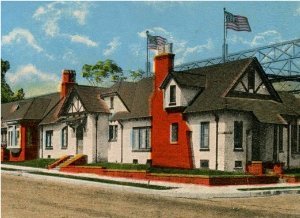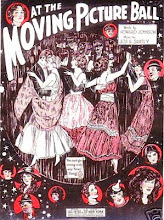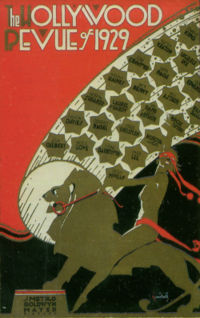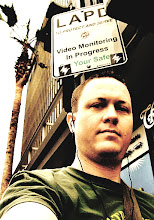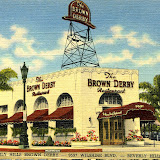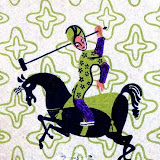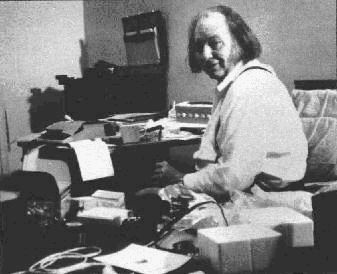5.25.2008
Say Goodnight Dick....
Dick Martin
Last updated: 11:00 PM BST 25/05/2008
Wisecracking co-star of Rowan and Martin’s Laugh-In whose humour caught the zeitgeist of the late 1960s.
Dick Martin, who died on Saturday aged 86, was the zany half of the American comedy duo Rowan and Martin and co-star of Rowan and Martin's Laugh-In, which became a cult comedy fixture on both sides of the Atlantic in the late 1960s and early 1970s.
Screened in Britain on BBC2, the show made stars of Goldie Hawn and Lily Tomlin and created such catchphrases as "Sock it to me!", "Here come de judge" and (Martin's own gnomic rejoinder) "You bet your sweet bippy".
After splitting with his partner Dan Rowan in the late 1970s, Martin went on to become one of American television's busiest directors.
Laugh-In, which was launched in January 1968, was unlike any comedy-variety show before it: rather than relying on tightly scripted song-and-dance segments, it offered a kaleidoscopic, almost stream-of-consciousness series of non sequitur jokes, political satire and wacky antics from a cast of talented young actors and comedians that included Ruth Buzzi, Arte Johnson, Henry Gibson, Jo Anne Worley, the British-born Judy Carne and the ear-cupping announcer Gary Owens.
Presiding over it all were Rowan and Martin, two veteran nightclub comics who put their own distinctive spin on the show. Their stand-up banter satirising the contemporary scene seemed to catch the liberated mood of the times.
Martin played the clown to Dan Rowan who, like all straight men, provided the voice of reason, striving to correct his partner's absurdities. Martin, meanwhile, was full of bogus, often risqué theories about life, to which he appeared to cling with unwavering certainty.
Around the sober-suited Rowan and Martin whirled a madhouse of stock characters, whose pop-up appearances and much-quoted catchphrases were redolent of the ITMA radio routines of wartime Britain.
The weekly galère included Lily Tomlin's nasal-toned switchboard girl; Arte Johnson's German soldier peering over a pot plant to observe: "Verrry interrrestink"; Goldie Hawn's giggling blonde; and Ruth Buzzi's umbrella-wielding old woman.
"We designed it so that we are two relatively normal guys wandering through a sea of madness," Martin explained. Each week Rowan and Martin would award their Flying Fickle Finger of Fate, host a gag-laden cocktail party and close each show with the programme's joke wall.
Richard Martin was born into a middle-class family on January 30 1922 at Battle Creek, Michigan. After leaving high school he elected to work at a Ford car assembly plant before making his way to Hollywood in 1943. While attempting to break into showbusiness, he earned his living as a bartender.
He was working in a cocktail lounge at Studio City, California, in 1952 when a mutual friend introduced him to Dan Rowan, a 30-year-old car salesman who was also trying to break into comedy. Within a fortnight they were appearing without pay at a supper club in Los Angeles with Rowan as straight man and Martin as his flippant partner.
In their first routine – which they kept in their act for years – Martin (the drunk) heckled Rowan (the Shakespearean actor) as he declaimed from Hamlet.
Once established on the American nightclub circuit, the pair signed a seven-year contract with NBC Television in 1957, only to cancel it by mutual agreement three years later after appearing regularly as hosts on the Colgate Comedy Hour.
In 1958 they starred in a feature film, Once Upon A Horse, but it flopped; and in 1962 Martin worked solo, appearing as Lucille Ball's boyfriend in her comeback situation comedy series The Lucy Show.
After Martin had rejoined Rowan on the nightclub circuit, in late 1967 NBC cautiously allowed the pair to film a "total comedy" pilot for Laugh-In, contracting them for a weekly series the following January. By the eighth show it was top of the ratings.
Much of the programme's success was down to the team of scriptwriters, whose jokes about gays, drugs and death were considered daring for 1968, especially by strait-laced Americans.
Martin remained unabashed at the show's frequent references to sex, explaining that his on-air persona – that of "a kind of inept lech" – made it possible for audiences to laugh at him rather than at what he said.
When Laugh-In was cancelled in 1973, Dick Martin pursued a new career as a director of television comedy, starting with The Bob Newhart Show in 1976. Later he was chief director of the 1980s sitcom Newhart.
At the height of his fame Martin (who was by then divorced from his first wife, Peggy Connelly) pursued a sybaritic lifestyle, throwing wild parties at his apartment in the hills above Sunset Strip. This existence was quite unlike that of Rowan, a quiet family man who died in 1987.
After his failed first marriage, Dick Martin married, in 1971, Dolly Read, a former bunny girl at the Playboy Club in London. They divorced in 1975 but remarried in 1978. She survives him with two sons of his first marriage.
Story from Telegraph News:
http://www.telegraph.co.uk/news/obituaries/2027643/Dick-Martin.html

Last updated: 11:00 PM BST 25/05/2008
Wisecracking co-star of Rowan and Martin’s Laugh-In whose humour caught the zeitgeist of the late 1960s.
Dick Martin, who died on Saturday aged 86, was the zany half of the American comedy duo Rowan and Martin and co-star of Rowan and Martin's Laugh-In, which became a cult comedy fixture on both sides of the Atlantic in the late 1960s and early 1970s.
Screened in Britain on BBC2, the show made stars of Goldie Hawn and Lily Tomlin and created such catchphrases as "Sock it to me!", "Here come de judge" and (Martin's own gnomic rejoinder) "You bet your sweet bippy".
After splitting with his partner Dan Rowan in the late 1970s, Martin went on to become one of American television's busiest directors.
Laugh-In, which was launched in January 1968, was unlike any comedy-variety show before it: rather than relying on tightly scripted song-and-dance segments, it offered a kaleidoscopic, almost stream-of-consciousness series of non sequitur jokes, political satire and wacky antics from a cast of talented young actors and comedians that included Ruth Buzzi, Arte Johnson, Henry Gibson, Jo Anne Worley, the British-born Judy Carne and the ear-cupping announcer Gary Owens.
Presiding over it all were Rowan and Martin, two veteran nightclub comics who put their own distinctive spin on the show. Their stand-up banter satirising the contemporary scene seemed to catch the liberated mood of the times.
Martin played the clown to Dan Rowan who, like all straight men, provided the voice of reason, striving to correct his partner's absurdities. Martin, meanwhile, was full of bogus, often risqué theories about life, to which he appeared to cling with unwavering certainty.
Around the sober-suited Rowan and Martin whirled a madhouse of stock characters, whose pop-up appearances and much-quoted catchphrases were redolent of the ITMA radio routines of wartime Britain.
The weekly galère included Lily Tomlin's nasal-toned switchboard girl; Arte Johnson's German soldier peering over a pot plant to observe: "Verrry interrrestink"; Goldie Hawn's giggling blonde; and Ruth Buzzi's umbrella-wielding old woman.
"We designed it so that we are two relatively normal guys wandering through a sea of madness," Martin explained. Each week Rowan and Martin would award their Flying Fickle Finger of Fate, host a gag-laden cocktail party and close each show with the programme's joke wall.
Richard Martin was born into a middle-class family on January 30 1922 at Battle Creek, Michigan. After leaving high school he elected to work at a Ford car assembly plant before making his way to Hollywood in 1943. While attempting to break into showbusiness, he earned his living as a bartender.
He was working in a cocktail lounge at Studio City, California, in 1952 when a mutual friend introduced him to Dan Rowan, a 30-year-old car salesman who was also trying to break into comedy. Within a fortnight they were appearing without pay at a supper club in Los Angeles with Rowan as straight man and Martin as his flippant partner.
In their first routine – which they kept in their act for years – Martin (the drunk) heckled Rowan (the Shakespearean actor) as he declaimed from Hamlet.
Once established on the American nightclub circuit, the pair signed a seven-year contract with NBC Television in 1957, only to cancel it by mutual agreement three years later after appearing regularly as hosts on the Colgate Comedy Hour.
In 1958 they starred in a feature film, Once Upon A Horse, but it flopped; and in 1962 Martin worked solo, appearing as Lucille Ball's boyfriend in her comeback situation comedy series The Lucy Show.
After Martin had rejoined Rowan on the nightclub circuit, in late 1967 NBC cautiously allowed the pair to film a "total comedy" pilot for Laugh-In, contracting them for a weekly series the following January. By the eighth show it was top of the ratings.
Much of the programme's success was down to the team of scriptwriters, whose jokes about gays, drugs and death were considered daring for 1968, especially by strait-laced Americans.
Martin remained unabashed at the show's frequent references to sex, explaining that his on-air persona – that of "a kind of inept lech" – made it possible for audiences to laugh at him rather than at what he said.
When Laugh-In was cancelled in 1973, Dick Martin pursued a new career as a director of television comedy, starting with The Bob Newhart Show in 1976. Later he was chief director of the 1980s sitcom Newhart.
At the height of his fame Martin (who was by then divorced from his first wife, Peggy Connelly) pursued a sybaritic lifestyle, throwing wild parties at his apartment in the hills above Sunset Strip. This existence was quite unlike that of Rowan, a quiet family man who died in 1987.
After his failed first marriage, Dick Martin married, in 1971, Dolly Read, a former bunny girl at the Playboy Club in London. They divorced in 1975 but remarried in 1978. She survives him with two sons of his first marriage.
Story from Telegraph News:
http://www.telegraph.co.uk/news/obituaries/2027643/Dick-Martin.html
Subscribe to:
Comments (Atom)
Blog Patron Saint Johnny Grant
-

A Picture Of The Biggest HO I Ever Stood Bent Over Behind, Groaning, Sweating, And Panting.
(Video) A Tour Of Charlie Chaplin Studios
(Video) A Tour Of The Tom Ince Studios, 1920
"There's A Tear For Every Smile In Hollywood!" - By Blanche Sweet
(Website) Taylorology
The Burning Of Los Angeles

March, 2007
"The Day Of The Locust" By Nathaniel West (Excerpt)
All their lives they had slaved at some kind of dull, heavy labor, behind desks and counters, in the fields and at tedious machines of all sorts, saving their pennies and dreaming of the leisure that would be theirs when they had enough. Finally that day came. They could draw a weekly income of ten or fifteen dollars. Where else should they go but California, the land of sunshine and oranges? Once there, they discover that....(Link To The Last Chapter and The Burning Of Los Angeles)
Doug Fairbainks As "Coke Ennyday" in The Mystery Of The Leaping Fish
(Video) Keep Young And Beautiful
There Are No Small Parts, Only Small Actors!






